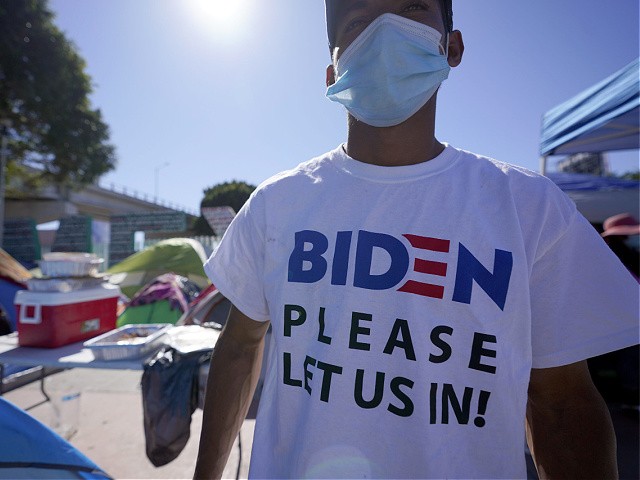
Republican House Minority Leader Kevin McCarthy (CA) and allied legislators are promising to defund President Joe Biden’s easy-migration policies in 2022.
“We’ll return to the policies that made our border secure,” McCarthy told an invited group of mainstream journalists — including Breitbart News — on October 21.
But the GOP leaders did not spotlight the economic damage done by Biden’s chaotic migration — even though many millions of Democratic-leaning suburban Americans worry that Biden’s migration is hitting them in the pocketbook.
Instead, McCarthy and allied legislators are replaying non-economic messages favored by the establishment GOP as they try to boost base turnout in 2022. Those messages tout legal immigration but slam illegal migration — and amnesty — for importing crime, chaos, drugs, terrorists, disease, and higher taxes.
“Democrats are doubling down on disastrous policies and incentivizing even more illegal immigration, which will make our current crisis worse,” McCarthy told the media event, which did not include reporters from establishment outlets.

House Minority Leader Kevin McCarthy (R-CA) arrives for his weekly press briefing on Capitol Hill in Washington, DC, on October 21, 2021. (Mandel Ngan/AFP via Getty Images)
“Hardworking taxpayers will suffer, and the drug cartels and human trafficking who are already exploiting the chaos at our border will be rewarded” if the Democrats’ draft amnesty plan becomes law, he added.
Rep. John Katko (R-NY) is McCarthy’s main spokesman on immigration issues for the 2022 election, and so he used the meeting to talk about terrorism, cartels, and crime, not jobs and wages:
We know a number of terrorists have been caught at the border … We’re not allowed to disclose [the number] publicly not because they’re classified, but because they’re designated law-enforcement sensitive.
“It is imperative that Republicans look at the immigration issue as a whole, both legal and illegal, as an economic issue,” responded Rosemary Jenks, the government relations director for NumbersUSA. “There’s no divide between legal and illegal when you’re talking about labor impacts, wage impacts, quality of life impacts, housing, [and] education.”
There’s much evidence that an economic pitch can overcome the Democrats’ perpetual campaign to paint the GOP as mean, racist, and hostile to migrants.

A Honduran man seeking asylum in the United States wears a shirt that reads, “Biden please let us in,” as he stands among tents that line an entrance to the border crossing, March 1, 2021, in Tijuana, Mexico. (AP Photo/Gregory Bull)
For example, roughly one-in-six of Biden’s 2020 voters say they strongly agree that illegal migration will drive up their housing prices, cut their wages, or take their jobs, according to an extensive survey sponsored by the University of Virginia’s Center for Politics. The survey spotlighted “Concerned Moms,” a broad group of Democratic-leaning swing voters who “are worried about higher housing costs, taxes, and potential negative employment effects due to immigration.”
Similarly, many polls show lopsided and bipartisan opposition to legal labor migration among GOP and swing voters. Every two weeks, Rasmussen Reports asks 1,250 likely voters, “When businesses say they are having trouble finding Americans to take jobs in construction, manufacturing, hospitality, and other service work, what is generally best for the country?”
In early October, 60 percent of political independents said it is “better for businesses to raise the pay and try harder to recruit non-working Americans even if it causes prices to rise.” Just 20 percent of independents said it is “better for the government to bring in new foreign workers to help keep business costs and prices down.”
McCarthy also avoided mentioning visa workers, even though the Fortune 500’s growing use of the foreign contract workers is pushing college-graduate Americans away from many promising and important white-collar jobs. This investor push is also diverting much wealth to the Democratic-run coastal states.

Wendy Gutierrez waves a sign during an Interfaith Rally for Muslims and Refugees at the Lutheran Church of the Redeemer on February 4, 2017, in Atlanta, Georgia. (Jessica McGowan/Getty Images)
A wide variety of pollsters have shown deep and broad opposition to labor migration and the inflow of temporary contract workers into the white-collar jobs sought by young U.S. graduates. This pocketbook opposition is multiracial, cross-sex, non-racist, class-based, bipartisan, rational, persistent, and recognizes the solidarity that Americans owe to each other.
The GOP “should pound the economic issue,” responded another advocate who is working to reduce migration. “If Republicans are serious about winning, the easiest winning issue is the economic impact of immigration that resonates across the country,” the advocate said.
McCarthy has not completely ignored the pocketbook pitch.
In September, his office spotlighted a speech by Rep. Yvette Herrell (R-NM). “We stand for our workers. We stand for law enforcement. We stand for safe communities. We stand for borders. We stand for America,” Herrell said.
But McCarthy is buffeted from all sides — and he needs to keep extracting donations from pro-migration business groups.
The Washington Post profiled McCarthy on October 22 and spent much of the article describing McCarthy’s zig-zagging between the business donors and the populist alliance of Donald Trump and his many blue-collar supporters:
He has been selling himself as a singular leader of the party, able to stand up to the unpredictable former president without breaking their bond.
“I stay close to him. We have a good relationship. But he and his team don’t have a veto power on what we do,” McCarthy, 56, tells the donors, according to the witness. He even contrasts himself with Senate Minority Leader Mitch McConnell (R-Ky.), who has distanced himself from Trump and earned his public scorn.
“I can do it,” McCarthy has assured his donors about the balancing act before him, according to the witness.
The GOP’s donors strongly oppose curbs on migration and repeatedly push the GOP to expand the inflow of foreign workers, consumers, and renters.
McCarthy’s zig-zag policy is risky because the GOP needs all the votes they can get, said Jenks. “People need to believe what the candidates are saying, and if you’re only willing to tinker around the edges, people are going see through that,” she said.

Haitian immigrant families cross the Rio Grande into Del Rio, Texas, on September 23, 2021, from Ciudad Acuna, Mexico. (John Moore/Getty Images)
Many GOP leaders zig-zag between donors and voters by arguing that legal immigration is good and illegal immigration is bad — even though both inflows push down wages, push up rents and divert much wealth from GOP districts to the Democrats’ coastal districts.
McCarthy told the reporters:
We believe in immigration. When you walk through my hallways [in Congress], you’re going to see up there my grandfather — it is his 100th anniversary of coming to America — and his paperwork from Ellis Island. We are all part of immigrants. We believe in the legal system. But … when you allow people to break the rule of law, you’re going to break down society
Rep. Tony Gonzales (R-TX) followed that zig-zag as he suggest that the GOP should welcome more legal immigrants:
I wish this administration would talk about merit immigration, right? Get back to that form of it … I see [migrant] folks that are small business owners or they’re doctors or they’re professionals, and you can tell that they’ve given up everything at a chance of a new life … they don’t want to do this [illegal] route. But the administration has not created a legal route for them to come, so they have to come this dangerous illegal route.
Rep. Troy Nehls (R-TX) echoed the legal/illegal distinction, saying that the Democrat draft amnesty:
is a way to circumvent the legal immigration process we have in this country. If you look at the data, there are over 31 visas opportunities — 31 [types of] visas afforded to people that want to come into this country and succeed through legal, the legal pathway to citizenship.
But the migration-fueled wealth-and-wage gap is also evident in the home districts of McCarthy and his deputies.
For example, McCarthy’s home district is west of Bakersfield, in central California, roughly 280 miles away from Rep. Nancy Pelosi’s district in San Francisco. The real estate values in her district are boosted by Congress’ policy of letting nearby Silicon Valley companies hire a huge population of cheaper foreign visa workers. But without that cost-cutting policy, the investors in Silicon Valley would be pressured to hire more Americans at good salaries and also to move jobs to cheaper cities.

House Speaker Nancy Pelosi (D-CA) reacts as she listens to a question from a reporter during her weekly press briefing on Capitol Hill, September 30, 2021, in Washington. (AP Photo/Andrew Harnik)
The same wealth-centralization process happens in other states, including in Texas. Nehls’ suburban district is just south of Houston, while Gonzales’ rural district runs along much of the inland border. Property values and household incomes in Gonzalez’s rural district are roughly half the value in Nehls’ suburban district, which includes a growing population of imported Asian white-collar workers.
As they avoided immigration’s pocketbook politics, the GOP leaders did, however, try to counter the Democratic narratives that Republicans are anti-migrant, mean, racist, and cruel. That narrative keeps many suburban women from voting GOP. For example, Gonzales painted Biden’s loose-borders policy as cruel:
So last week — and it’s just one of thousands of stories — last week there was a [migrant] family traveling through Eagle Pass on a train. It was a 27 year old husband male, female, and their daughter. And they’re jumping off the train and what happens? The husband loses his arm. The wife loses her foot, and the one year old … little girl loses parts of her hand. These are the stories that don’t make it out. When this administration encourages amnesty, this is what it encourages.
Katko also spotlighted the trauma caused by the Democrats’ welcome for migrants.
The cartels are probably earning “well over $1 billion a month” by smuggling migrants, Katko continued. ‘The are sexual assaults at least a third of the women that are brought to the border are sexually assaulted,” said Katko.

Migrants bathe in the Rio Grande River near a makeshift encampment under the International Bridge between Del Rio, Texas, and Acuña, Mexico, on September 17, 2021, in Del Rio, Texas. (Jordan Vonderhaar/Getty Images)
Katko has minimized any mention of jobs, wages, or housing in his migration platform for 2022, despite his district’s loss of jobs and wealth to migration-inflated New York.
That Democratic welcome for poor migrants is just part of a bipartisan economic policy that seeks to extract migrant consumers, renters, and low-wage workers from poor countries for use in the U.S. economy.
Rep. Kat Cammack (R-FL) emphasized crime:
One example just from my little district in North Central Florida. There were two individuals that had been deported previously. [They] snuck back into the country — [and were implicated in a] double homicide — and they were headed back for the border… These people are coming in, dealing in narcotics. The crime that is happening in our communities is a direct result of this administration’s open border policies. And if you combine that again with the defund police movement, we all know that you can’t protect your hometowns if you can’t defend the homeland… We have to start really screaming from the rooftops about the dangers of what these social programs [in the reconciliation package] are going to do not just dollars and cents, but the effect that they’re going to have in our hometowns.
Rep. John Rutherford (R-FL) also stressed crime:
I’ve documented over 50 flights into Jacksonville International Airport in Northeast Florida — over 7,000 kids and adults who have come through that location … I can tell you speaking as a sheriff who had a community where a large illegal alien subculture was allowed to grow.
When that happens, not only did they victimize the community around them, but [they also] victimize the illegals who will not report [crimes to police]. And when we found out about this, we were able to get into that subculture. [We saw] the rape, the sexual battery, the domestic violence that was off the chain within the illegal community … A lot of these people, they don’t pay that [smuggling fee of] $4,000, $8,000 up front. Many of them are going to get here and work it off, and they’re going to work it off through crime.
Rutherford did not mention the commonplace practice of U.S. companies hiring illegals instead of hiring Americans.
Several of the GOP members also argued that Biden’s migration is deliberate. “They stopped building the wall and actually are paying people not to build the wall,” added Rep. Jim Jordan (R-OH). Biden’s flood of illegal migrants “is deliberate. This is intentional,” he added.

President Joe Biden stands alongside Secretary of Homeland Security Alejandro Mayorkas (L) after signing executive orders related to immigration in the Oval Office of the White House in Washington, DC, February 2, 2021. (Saul Loeb/AFP via Getty Images)
McCarthy’s meeting did not include GOP legislators who are spotlighting the economic impact of migration. For example, Rep. Jim Banks (R-IN), the head of the Republican Study Committee, was not at the presentation.
On October 22, the Washington Post published a brief interview with one of Trump’s top immigration appointees, Ken Cuccinelli.
The Post asked: “Finish this sentence: The worst thing about Washington is _______.”
Cuccinelli replied:
Probably the desire to simply fight, rather than do. A good example is Republicans on immigration. They just want to scream about it in campaigns, much like they did Obamacare for many years. They didn’t actually want to fix it.
If the Republican Party “focuses on the well-being of working-class Virginians and their families, then Republicans are going to be dramatically unbeatable across the country,” Cuccinelli said.
“We’re talking about life and death issues for American workers,” said Jenks. “Tinkering isn’t going to solve the problems, and people know that.”
Related posts:
Views: 0
 RSS Feed
RSS Feed

















 October 26th, 2021
October 26th, 2021  Awake Goy
Awake Goy  Posted in
Posted in  Tags:
Tags: 
















